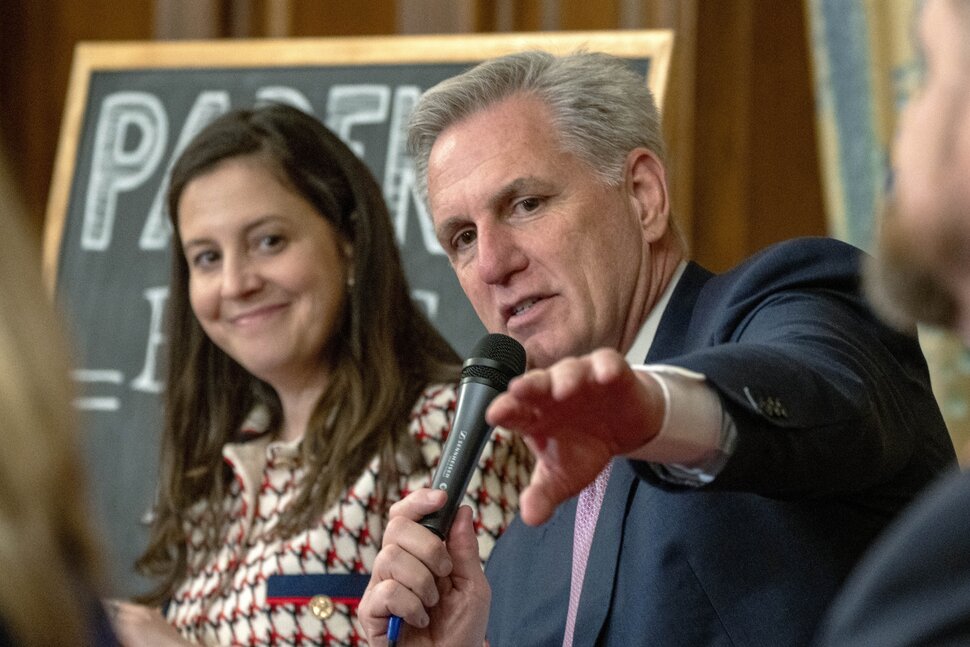Republican governors are pitching – and GOP-controlled statehouses are eagerly advancing – sweeping K-12 overhauls that empower parents far beyond just mandating what they can know and say.When House Speaker Kevin McCarthy introduced in the Republican-controlled chamber his “Parents Bill of Rights Act,” he made good on a major GOP campaign pledge to elevate the role of parental control in public schools across the country.
“You have a say in your kids’ education – not government and not telling you what to do,” the California Republican said last week during an education policy discussion.
The bill is a revival of a legislative proposal Republicans pitched in 2021, during the fallout over pandemic schooling at a time in which school board meetings were overwhelmed by throngs of parents angry about masks, virtual learning and the types of books their children were reading – a stew of culture war issues strategically magnified by conservative politicians.
Among other things, the bill would require schools to publicly post their academic standards, curriculum, school budget and spending, and a list of books available in libraries. It would mandate two parent-teacher conferences each year and enshrine the existing rights of parents to speak at school board meetings. And it would prevent schools from sharing or selling student data to tech companies.
It’s unclear what type of teeth it would have and how much it would cost to police each provision. Of course, that’s not the point since the bill is set to die in a Democratic-controlled Senate. But heading into a 2024 presidential election, what’s most important is what it signals to parents: that at a moment when their children are struggling with unprecedented academic setbacks and mental health challenges, when public school enrollment is careening and teacher shortages are piling up, they can play a crucial role in controlling the chaos and choosing for themselves what they want their children to learn.
The strategy is already playing out in real time in red states across the country as Republican governors pitch sweeping K-12 overhauls seizing on the parental education movement – overhauls that go well beyond simply mandating what parents can know and say – that GOP-controlled statehouses are eagerly advancing and adopting.
In Arkansas, Gov. Sarah Huckabee Sanders announced a 144-page proposal that would boost starting salaries for teachers from $36,000 to $50,000, provide performance bonuses of up to $10,000 and allow teachers up to 12 weeks of maternity leave, while also eliminating the state’s mandated salary schedule, which sets pay ranges for teachers based on their years of experience and education. The legislation would also establish a voucher program that would divert public funding to help parents pay for private and home-school options and ban instruction on sexual orientation and gender identity before fifth grade and the teaching in all grades of critical race theory – an esoteric, graduate-level academic inquiry that has become an umbrella term for teaching a version of history emphasizing institutional racism.Sanders, who said that the education package was her top priority in this legislative session, called the proposal “the biggest, most far-reaching, conservative education reform in America,” even as Democratic opponents compared it to a poisoned cheeseburger.
The bill is expected to receive final approval in the state Senate next week.
Florida Gov. Ron DeSantis, the parental rights darling who’s left an indelible mark on his state’s K-12 system by establishing a slew of controversial policies – like banning books that center on racial and ethnic minorities, prohibiting discussions about LGBTQ issues, barring efforts to increase diversity and equity and gutting anything that smacks of critical race theory – introduced a similarly sweeping K-12 overhaul last month focused on boosting teacher pay while curbing the power of teachers unions.
Republican Gov. Kim Reynolds of Ohio signed into law last month a massive $345 million school choice bill that will allow families to use taxpayer funds to cover private school tuition up to about $7,600 a year – a proposal that sped through the state’s House and Senate chambers and was on the governor’s desk in just two weeks.
In Ohio, a bill is expected to pass as early as this week that would strip the state school board of nearly all of its authority by placing a director in the state’s education department who is part of Republican Gov. Mike DeWine’s Cabinet. As it stands, the education department is controlled by the Ohio Board of Education, but that would no longer be the case with the exception of teacher licensing and the hiring of a state superintendent.
Meanwhile, in Texas, where a “Parents Rights and Responsibilities” is already enshrined in state law and gives parents significant control over their child’s education, Republican Gov. Greg Abbott announced his plans to support a bill that would establish education savings accounts to help families who opt out of public school afford tuition at private schools and other education expenses.
His backing of the measure is noteworthy, as various school-choice proposals have failed in Texas in recent years due to opposition from legislators who represent rural districts whose constituents don’t have private school options – or any option other than local public schools.
Abbott said the proposal, which would offer families who opt out of public school roughly $10,000 each year, “will give all parents the ability to choose the best education option for their child.”
“The bottom line is this: This is really about freedom,” he said in January. “No one knows what is better for a child’s education than their parents. Parents deserve the freedom to choose the education that is best for their child.”
The strategy is set to continue in the run-up to the 2024 presidential election, where GOP presidential hopefuls have already begun jockeying to control the space. At the annual Conservative Political Action Conference last week, where MAGA Republicans celebrated their policy platforms with panels titled “Parents With Pitchforks,” the message was clear: Elevate the role of parents in their children’s education – even above that of life-long educators and child development experts – and they’ll back you at the ballot box.
“We’ve got to get people elected who want parents to have a choice to send their children to whatever school that they want,” said Virginia’s Republican Lt. Gov. Winsome Earle-Sears, who spoke on the panel and compared the push for parental rights in K-12 education to the landmark civil rights Supreme Court case Brown v. Board of Education that determined segregation in schools was unconstitutional. She’s also pushing an education savings account bill in the legislature.
“This is like a no-brainer,” she said.
“The reason why we won in Virginia,” she said, “is because parents – and it didn’t matter whether they were Republicans, Democrats, whatever they were – they decided: You know what? Party loyalty is one thing. But when it comes to my child, all bets are off.”

